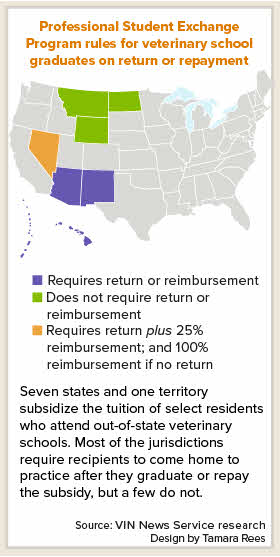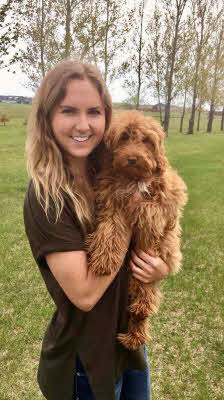N. Dakota recipients may work elsewhere without penalty; Wyoming, too — for now
 Veterinary students from North Dakota and Wyoming who receive state subsidies on their out-of-state tuition are free to practice anywhere without having to repay the cash, thanks to a pair of recent legislative actions.
Veterinary students from North Dakota and Wyoming who receive state subsidies on their out-of-state tuition are free to practice anywhere without having to repay the cash, thanks to a pair of recent legislative actions.
North Dakota Gov. George Burgum in late March waived a "come back or pay back" provision passed in 2019 to incentivize medical professionals to work in their home states within three years of graduating. In signing SB 2140, Burgum reversed the mandate, which applied to the state's Professional Student Exchange Program (PSEP) participants in veterinary, dentistry and optometry schools who entered PSEP after July 1, 2019.
In Wyoming, students likewise won a reprieve when Gov. Mark Gordon vetoed legislation, SF 93, that would have required veterinary school graduates receiving PSEP subsidies to practice full-time in Wyoming for at least three years or repay the money with interest.
PSEP is a program of the Western Interstate Commission for Higher Education (WICHE) through which states that lack schools in certain health professions may subsidize the tuition of residents attending participating schools in other states. The subsidies trim $32,000 to $130,000 from the cost of education, according to the WICHE website.
To obtain a subsidy, aspiring veterinary students must apply, certify their state residency and go through admissions processes at one or more of these institutions with participating veterinary programs: Colorado State University, Midwestern University in Arizona, Oregon State University and Washington State University.
The relief in Wyoming for veterinary students may be short-lived. In a statement dated April 2 about the bill he vetoed, the governor wrote, "I support the policy laid out in the bill and generally find the bill to be appropriate." However, he said, he did not want to implement the change immediately as required by the legislation, owing to the effects on students already in the program.
"I cannot imagine that the Legislature would want to inadvertently and detrimentally impact students without at least offering some sort of reasonable transitional approach or way to 'grandfather' this current class of veterinary students," he said, inviting lawmakers to resubmit the bill next session with that in mind.
For now, officials of veterinary medical associations in both states commend the actions permitting new veterinary school graduates to work outside their home states without having to repay the subsidies. The Wyoming and North Dakota professional advocacy groups contend that their small states might not provide enough suitable jobs to accommodate the new graduates.
In addition to Wyoming and North Dakota, Montana does not require PSEP recipients to return to work after graduation but expects them to do so under an honor system.
Four states and territories that provide PSEP funding for veterinary school students do require that the students return home to practice or pay back the money. The jurisdictions are Arizona, Hawaii, New Mexico and the Northern Mariana Islands, according to Margo Colalancia, WICHE's director of student access programs.
Nevada, too, has a program to subsidize out-of-state veterinary school tuition for residents but stopped funding it last year for incoming students. The state is continuing to fund veterinary students who are already in the program and looking for alternative ways to attract more rural and food animal veterinarians in the future, according to the Nevada Western Commission for Higher Education.
Students who felt blindsided express relief
Among students happy about the rule reversal in North Dakota is Victoria Laven, who had successfully applied for a PSEP spot in fall 2019, the same year that the state enacted a "come back or pay back" requirement.
North Dakota has 12 PSEP slots for veterinary students, according to Pat Anderson, executive director of the North Dakota Veterinary Medical Association. One is designated for a student attending a WICHE school. The rest are reserved for seats at the University of Minnesota, Kansas State University and Iowa State University, schools with which the state has separate agreements.
Laven focused on applying to PSEP-eligible schools and found out about the new requirement in the midst of the application process. Feeling blindsided, she decided it was too late to look at other schools. She stayed the course, ultimately heading to the University of Minnesota, where she is finishing her first year.
The Fargo local appreciated the financial assistance but was disappointed by the limits that the new law placed on her future. Laven, 26, aspires to specialize in emergency medicine and says few to no internships or residencies exist in North Dakota. She reasons that she would have had to postpone specialist training until completing the required years of service. By her calculation, that would make her 36 years old by the time she attained board certification.
Victoria Laven

Photo courtesy of Victoria Laven
Victoria Laven is a first-year veterinary student at the University of Minnesota whose tuition is subsidized by home state, North Dakota.
"For it to take that long to get me to where I wanted to be was not the ideal timeline for me," she said.
Before the return-or-reimburse law passed in 2019, there were earlier unsuccessful attempts to establish the provision, including in 2017. In the final days of the 2019 legislative session, the measure was added as an amendment to a bill in a conference committee, enabling it to pass under the NDVMA's radar, Anderson said.
During the 2021 session, lawmakers took up a bill to repeal the 2019 law. Laven testified in support, as did her friend, Brooke St. Germain, a first-year Iowa State student interested in mixed animal practice. St. Germain plans to return to North Dakota regardless but said she spoke up on behalf of students in the program who might have struggled to find jobs.
The case for keeping return to Wyoming optional
Similarly, the Wyoming Veterinary Medical Association opposes mandates requiring PSEP students to return home to practice, due to a scarcity of job vacancies.
"Because of our relative low population, there are simply not as many veterinary clinics in Wyoming," said Dr. Mike Meeboer, a WVMA board member. "Besides five or six cities that have more than 15,000 people, most of our towns that would have one or possibly two clinics probably have 3,000 to 5,000 people."
Dr. Tiffany Healey, a veterinarian in Cheyenne and second president-elect of the WVMA, estimates that four to six veterinary students in Wyoming complete school under the WICHE program each year. At the hearing on SF 93, she pointed out that the $185,000 average debt of veterinary students in the United States dwarfs their average starting salaries of $85,000.
WICHE funding for veterinary medicine this past school year was $32,400 per student. Under SF 93, non-returning students would have to foot that bill on top of any student debt, Healey said at the hearing. She predicted that the financial burden would make "a lot of students reconsider their career choice."
Meeboer told the VIN News Service that the issue isn't that new veterinary graduates don't want to work in their home state. On the contrary: "I think many Wyoming-raised new veterinarians would like to practice in Wyoming at some point, but it may be after they reduce their debt somewhat or take a higher paying job elsewhere for a few years ..." he said. "I think forcing them to start here is counterproductive to attracting them to work here at some point."